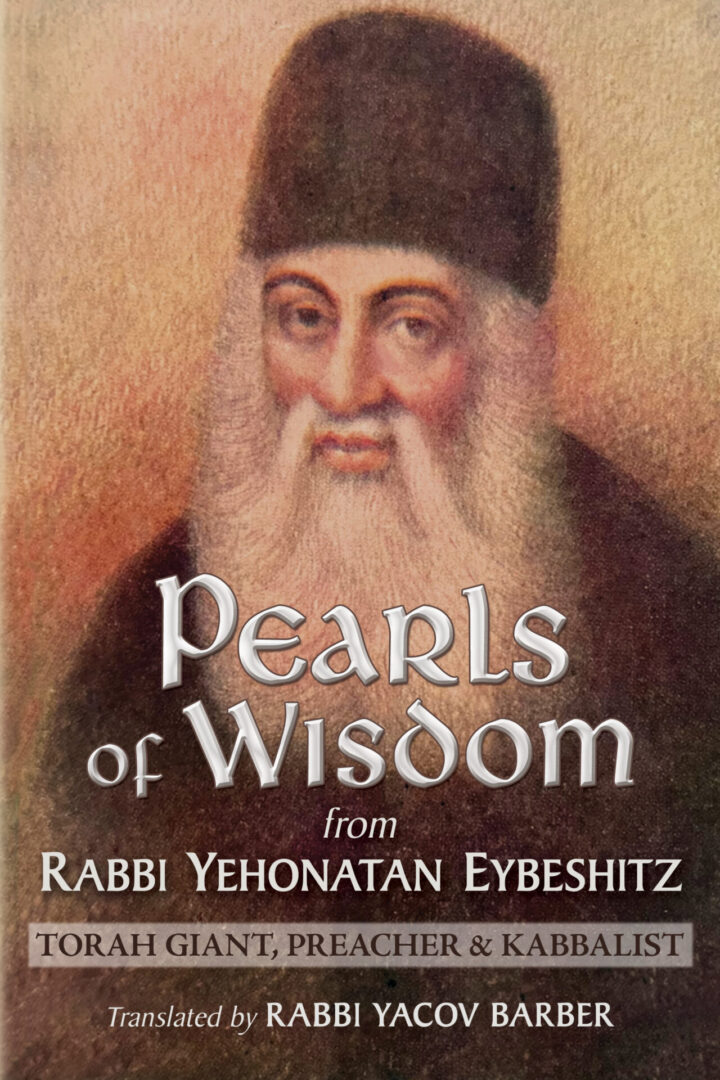
Kirkus Reviews
An English translation of the teachings of influential Rabbi Yehonatan Eybeshitz.
Julie Gerber has long been fascinated and inspired by her distant ancestor and 18th-century Jewish teacher, commentator, and cabbalist Rabbi Yehonatan Eybeshitz. When she found Barber, Gerber knew he was the ideal person to translate her acclaimed forefather’s work from Hebrew to English. As a prolific author and Jewish scholar, Rabbi Barber has an “elevated knowledge” of Eybeshitz’s infamously esoteric writing. He draws on a deep understanding of Hebrew and Jewish tradition to offer readers the first comprehensive English translation of Eybeshitz’s work. The book begins with Eybeshitz’s biographical information, from his early years in Poland to his high-profile dispute with a German rabbi over amulets he provided to pregnant women. Eybeshitz’s writings, the book’s titular “Pearls of Wisdom,” comprise two parts. The first consists of concise, yet densely packed, commentary on weekly Torah readings that span from Adam to Moses. With remarks as short as a page in length, these insights are meant to be “read a number of times (even if one understands the idea after the first reading) to fully appreciate the various subtleties being conveyed.” Some chapters address practical questions that naturally arise in the Torah, such as how Noah’s ark held and fed every animal in the world despite its physical limitations (the answer, in brief: God provided). Other chapters feature painstaking, multipage discussions of the hidden meaning behind a single word in an obscure verse. The second part of the book centers on Eybeshitz’s commentary pertaining to Shabbat, holidays, exile, and the “End of Days.” Like his teachings on the Torah, Eybeshitz’s approach to Shabbat uses arcane details, such as in-depth discussions about cutting fingernails or building a fire, to illuminate broader spiritual truths, like the purpose and meaning of Shabbat and its connection to the Tabernacle. The book’s last section addresses Eybeshitz’s ideas pertaining to the messianic era.
Reflecting the desires of Jews born in the 1600s, Eybeshitz emphasizes that “no Jew will be left behind” during this age as he eagerly awaits the return of Jews from Spain and Portugal “who were forced to abandon their faith” during the Inquisition. Though Barber openly acknowledges that Eybeshitz’s teachings “are complex and demand a great deal of prior knowledge,” this volume is remarkably readable. However, more historical context, annotations, and editorial commentary would help neophytes make headway through Eybeshitz’s most cryptic passages. Those outside Orthodox communities who seek answers to 21st-century issues on topics from sexuality to social justice may also not find many answers here. Additionally, despite the book’s brief biographical materials, readers who are encountering Eybeshitz for the first time may find themselves wanting for more concrete analysis of the legacy and import of his teachings to future generations, a claim that is often made in Gerber’s and Barber’s commentaries but rarely elaborated upon. Though these things may limit the book’s reach, rabbis and scholars of Judaism will find much to admire, and learn from, in this impressive translation.
An often profound, if occasionally abstruse, introduction to the work of a leading 18th-century rabbi.
Publishers Weekly
Pearls of Wisdom from Rabbi Yehonatan Eybeshitz: Torah Giant, Preacher & Kabbalist
Yehonatan Eybeshitz, trans. from the Hebrew by Yacov Barber. Gerber’s Miracle, $24.95 trade paper (286p) ISBN 978-0-578-85367-3
These selected biblical commentaries by Polish rabbi Eybeshitz (1696–1764), “one of the greatest Torah scholars of the last 300 years” according to Barber, provide intriguing insights into 18th-century Judaism. The excerpts include brief thoughts on the weekly Torah portions, sections covering Shabbat and Jewish holidays, and the kind of deep analysis beloved by scholars who believe each letter in the Jewish Scriptures has significance. His discussion of the first chapter of Genesis, for instance, focuses on the reason why the word “luminaries,” which appears twice in that chapter, is spelled differently; Eybeshitz concludes the omission of one letter in the first use of the word is intended to signify that the moon (one of the luminaries referenced) is not itself luminous, but only provides reflections of the sun’s light. Also of note are Eybeshitz’s thoughts on a Jewish return to Israel and the influence of Jewish culture in Spain and Portugal. Disappointingly, the rabbi’s views on challenging passages, such as the akedah, or the murderous attack on Moses in Exodus, aren’t included. Those seeking to better understand traditional biblical interpretations will have plenty to chew on. (Self-published)
BookLife Review of Pearls of Wisdom
"Translated into English for the first time by Rabbi Yacov Barber, this collection makes available to new audiences the thinking of one of the great Torah scholars, the 18th century Rabbi Yehonatan Eybeshitz. The writings are divided into two parts: one focusing on the Torah specifically, and the other exploring more general topics, including Shabbat, exile, and the Messianic Era. Each chapter examines verses in-depth, analyzing language choice, studying potential discrepancies, and artfully answering lingering questions. As a preeminent Halachic authority, a revered Talmudist, Kabbalist, and prolific author, this accessible compendium of Eybeshitz’s work adds fascinating new layers to study for those who are interested in Jewish tradition, Jewish law, and world history.
For those who are interested in deep, textual study of the Torah and its teachings, this is a welcome addition to the canon, translated with clarity and coherence. Eybeshitz pulls from a variety of sources and covers topics as widespread as Creation, Shabbat, and the coming of the Messiah with deft, logical prose. The style is in the traditional question-and-answer: In each short section, Eybeshitz poses queries based on earlier commentary or the Torah itself and, several dazzling paragraphs later, arrives at a resolution ready to be considered and debated by scholars of today or centuries from now.
A great Talmudist and Kabbalist of the 18th century, translated into English at last."
For the full Booklife Reviews link, click below: